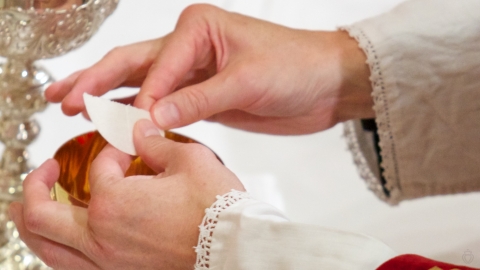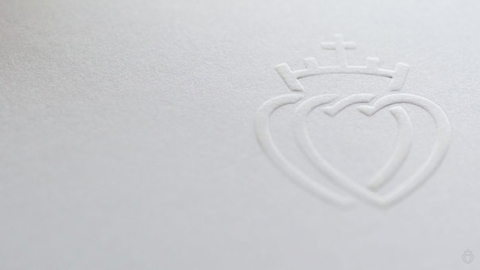The Stages of True Conversion
Continuation of Fr. Patrick Troadec’s study on:
The Psalms: An Effective Prayer in This Time of Epidemic
Since the cause of the plagues which ravage the world and especially the coronavirus which prevails at present, is the sins of men, it is important that our formerly Catholic countries convert and return to Jesus Christ who is the only Savior. Pending the return of the nations to Jesus Christ, may each of us make our own mea culpa, acknowledge our faults and take advantage of this period of confinement to truly convert. Did not our Lord say to Peter, who had already been following Him for some time, “when you are converted, strengthen your brothers?” (Lk. 22:32). The holier we are, the more good we can do for those around us. Also, let us be aware of the different steps to take to achieve a life change that is truly pleasing to God.
Preparation for Confession
The first provision to cultivate in order to confess well consist in recognizing one’s own misery. Holy King David recognized it when he said: “As for me, I am poor and needy; but the Lord takes care of me. You are my helper and my protector. O my God, do not be slack” (Ps 39:18).
God gives His grace to the humble. The smaller we are in our own eyes, the more God will be able to act in us and answer our prayers. To recognize our own misery, we must have confidence in His mercy. This is why, after having said “I am poor and needy,” the Psalmist hastens to add to the address of God: “You are my helper and my protector.”
To touch the heart of God, the Psalmist relies on divine mercy: “Turn to me, O Lord, and deliver my soul; save me for Your mercy’s sake” (Ps 6:5).
In another psalm, he says: “Remember, O Lord, Your compassion and Your mercies, that are from the beginning of the world” (Ps 24:6).
St. Augustin comments on this verse. “If the Psalmist asks God to remember His mercies, it is because men think, so to speak, that You have forgotten them. By specifying that these mercies began with the world, he wants to make it clear that God has never been without mercy.”[1]
“Wash me yet more from my iniquity, and cleanse me from my sin” (Ps 50:4).
Man falls into sin by himself, but only God can lift him up. This is why King David asks for this grace from God. In verse 11, he says: “Turn Your face away from my sins, and wipe away all my iniquities.”
A Profound Contrition
The Psalmist is well aware of the need for contrition to touch the heart of God since he writes: “A sacrifice that God loves is an afflicted spirit; a contrite and humbled heart, O God, You will not despise” (Ps. 50:19).
“We have sinned with our fathers, we have acted unjustly, we have wrought iniquity” (Ps 105:6).
“For I know my iniquity, and my sin is always before me. I have sinned against You only, and I have done evil before Your eyes” (Ps 50:5-6).
Just as the Psalmist confesses his faults before God, so today we, each of us, must recognize our own sins before Him while waiting for the opportunity to make a good confession. It is a question of arousing great contrition in us so that the good Lord will erase our faults. One can also apply these verses of psalms to the public sins of the nations and in particular to the apostasy as well as to the moral disorders which resulted from it.
The Firm Purpose
David names the effects of a good confession in Psalm 50 which is, par excellence, the psalm of penance, that is, sincere repentance for one’s faults.
“Give me back the joy of Your salvation, and strengthen me with a generous spirit. I will teach the unjust Your ways, and the wicked shall be converted to You.” (Ps 50, 14-15)
A righteous, generous spirit, a pure heart source of joy, a great missionary zeal, these are the marvelous effects of a good confession.
To remain faithful to God, it is necessary to remember one’s faults, what spiritual authors call compunction. The holy King David put it this way: “I will wash my bed with tears every night; I will shower my pillow with my tears” (Ps. 6:7).
Saint John Chrysostom commented: “David is not satisfied with crying only one time over his faults, his entire life was spent practicing penance. Let us imitate his repentance; if we refuse to weep for our faults here on earth, we will have to weep for them in the next life, but without any use, while here on earth our tears will store up fruits for salvation.” [2]
One of the most effective fruits of a good confession is to stay away from occasions of sin. The Psalmist realized this when he writes: “Depart from me, all you who commit iniquity, for the Lord has heard the voice of my tears” (Ps. 6:9).
St. John Chrysostom continues his reflections thus: “Our Lord teaches us when he says: “If your eye scandalizes you, tear it out; if your hand causes you scandal, cut it off …” (Mt. 5:29-30) Here, David does not mean the members of our body, but our most intimate friends. We must sacrifice friendship when it is no longer useful, and it becomes harmful to our friends as well as to ourselves. Faithful to this salutary command, not only did David not seek friends, but he also commanded them to move away from him.” [3]
In this period of confinement, let us think of making acts of perfect contrition, that is to say acts of contrition for love of God, to regain a state of grace if we have lost it while we are waiting to make a good confession.
Fr. Patrick Troadec
[1] According to The Last Ending in the Psalms, Clovis, 2010 p.111
[2] St. John Chrysostom, The Complete Works, Vives, 1867, p.628
[3] St. John Chrysostom, The Complete Works, Vives, 1867, p 629-630
Related links
(Source : FSSPX - FSSPX.Actualités - 04/04/2020)



